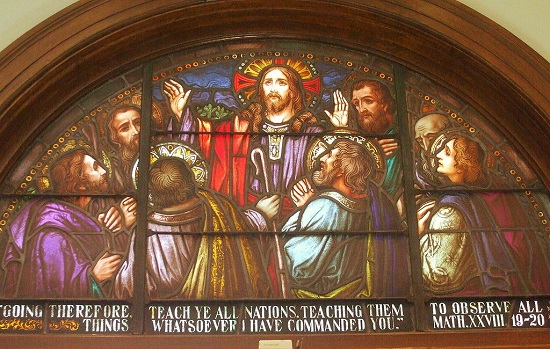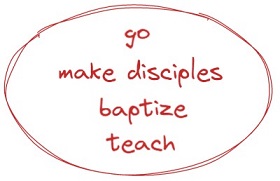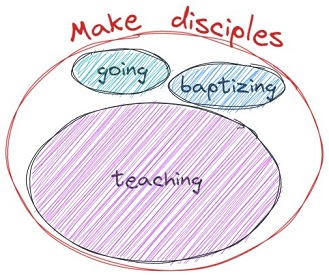What Jesus sends his followers out to do

This post is the third part of a multi-part post. In the past two months, I needed all of my time to prepare for a seminar. That’s why this post appears late.
In the [previous part], we dealt with what a disciple is, and why the general understanding of being a Christian does not have too much to do with being a disciple. Today, the question is what it really means: to be a disciple.
Doing what Jesus did
What exactly does Jesus want from his followers?
Therefore go and make disciples of all nations, baptizing them in the name of the Father and of the Son and of the Holy Spirit, and teaching them to obey everything I have commanded you. (Matt. 28:18-20; NIV)
What matters to Jesus is that we continue the work that he started. And that we do it the way he did it. That is, he made people his disciples, and that’s what he wants his followers to do, you and me. But how does he envision this?
Let’s take a closer look at our translation, especially the words go, baptize and teach. They have a special grammatical form in our text: they are participles.
Why is that important? Depending on the translation you use, it may look like Jesus is giving four instructions to his disciples: 1. go, 2. make disciples, 3. baptize, and 4. teach.

But if we look closely, there is only one explicit instruction: “make people my disciples “. Everything else (walking, baptizing, and teaching) are only the means to reach the goal Jesus has set.

Great Commission and Church
Have you ever noticed that Jesus almost never evangelized directly?
What did he do instead? His ministry had two directions:
- By far the most time Jesus devoted to his disciples. He trained them very intensively. Thus, he worked inwardly, investing in the community of his followers.
- To people outside this narrow circle, he showed what the kingdom of God is like. And he let them participate in it, took them into the blessing of the kingdom of God: Healing, forgiveness, being made whole. This part of his work he directed outward.
Today, we focus on the inward work. How can we live the mission of Jesus in our church, in the community of his followers?
- Walking: This is less necessary within the congregation. We meet in worship, in small groups, or teams. So, this point does not need a strong emphasis in the church.
- To baptize: The vast majority of people who feel they belong to a congregation already are baptized. For all others, there are more or less regular offers to be baptized. Therefore, this too isn’t the focus of our attention.
- That leaves teaching. Here we could say: This is also not really relevant for us. After all, there is a sermon every Sunday in the church service. And whoever wants to, can additionally go to a cell group with more input. In addition, there are plenty of Christian books, magazines, and TV stations from which we can learn.
Nevertheless, as we shall see, the emphasis is clearly on teaching.
[…] make disciples, […] teaching them to obey everything I have commanded you. (Matt. 28:18-20; NIV)
The ABC of being a Disciple
And here we come to a sore point probably of just about every congregation.
During my summer vacation, I visited a church in southern Germany. The preacher used an image that has stuck with me. He spoke of the Christian ABC topics and the XYZ topics.
- ABC: These are the truly relevant topics, the foundations of our faith and life.
- XYZ: These are the more or less unimportant things that we like to deal with.
We hear a lot of sermons about all kinds of things, and I think there are too many XYZ topics in them. That does not mean the sermon isn’t interesting. It also doesn’t mean you don’t get anything out of the sermon. It just means there are more important topics that would indeed help you on your way.
Some congregations focus on the so-called “end times.” The central theme of other communities is practicing spiritual gifts. Or every other Sunday, you hear that no Christian has to suffer: It is all about healing and prosperity. And in many congregations, it is common to have great arguments about the finer points of doctrine: Infant or adult baptism? Does the gift of tongues still exist that Paul writes about, or has it become superfluous?
All these are topics that refer (more or less justified) to the Bible. The problem is that they easily get too much weight, that they become our ABC topics.
But what would Jesus say are ABC subjects? What is it that he wants his followers to teach? He leaves no room for interpretation there: “Teach them to observe all that I have commanded you.” It is all about what He taught.
Could it be that today’s evangelical and charismatic Christianity is more of a Pauline church than a Jesus church? Why? Because we often find it so much easier to discuss theological details instead of how to live Jesus-like. For example, how many sermons deal with issues we take from Paul’s letters? Or worse: with individual statements somewhere in the Bible, whose alleged meaning can only be understood when they are taken out of context and blown up to become central doctrines?
And in proportion, how many sermons focus on a specific word, instruction, or rule of life of Jesus?
What did Jesus teach?
“Teach them to obey everything I have commanded you.” What did Jesus command? What did he teach? There is the Sermon on the Mount, first of all. Then the many teachings he wrapped up in parables. And finally, the unspoken lessons we can learn by observing his life. There really is enough material for our sermons.
Perhaps we should spend much more time on what Jesus taught. In our private time with God, in the cell group, in the church service. That would certainly be valuable: for us personally, but also the external effect of the community of Jesus followers.
But even that is not enough. Jesus’ main interest is not that people get to know his teachings. Again, that would be too superficial. He does not say, “Make men my disciples, teaching them all that I have commanded you.” He says:
make disciples, teaching them to obey everything I have commanded you. (Matt. 28:18-20; NIV)
The task of the church, the cell group, and your private time with God is to learn to implement in your life what Jesus taught. It is not enough to know. Jesus is concerned that we begin to follow His teaching and His life by incorporating it so consistently into our daily lives, that we become more and more like Jesus.
And that’s what we do lack. That is what is sickening our communities.
I’d like to remind us of the quote by Justin Gravitt from the [previous post]:
[The word “Christian” is] now a term of belief more than behavior. It no longer indicates someone who looks and acts like Jesus but is more commonly used of someone who has intellectually accepted the tenets of Christianity. Instead of being recognized by their actions, today’s Christian is someone who has accepted Jesus as their personal Savior and who identifies with the Christian religion.
If we want to follow the “Great Commission,” we must get this right: to move away from a head religion to a heart-, hand- and foot-way of life that makes us recognizable as disciples of Jesus. That is the only thing that matters.
Jesus said:
Not everyone who says to me, “Lord, Lord,” will enter the kingdom of heaven, but only the one who does the will of my Father who is in heaven. (Matt. 7:21; NIV)
It is not enough to believe that Jesus is Lord, that is: our Master. It is not enough to know what Jesus taught. What matters is to live his teachings daily.
So, this is what the “Great Commission” is about: that we teach ourselves and one another to obey everything Jesus commanded us. That is what it means to become a disciple of Jesus: Little by little, step by step. That’s what it means to become His image. The more Jesus becomes recognizable in you and me, the more we can put into practice Jesus’ command to introduce others to our Master, our Teacher, our Savior.
In the next post, I will describe how I am trying to do this myself: to become a more consistent disciple of Jesus.
Until then. Be blessed!
Gravitt
Justin G. Gravitt - [What’s the Difference? Christian vs. Disciple]; abgerufen 2021-09-17.
Cover photo: Lyricmac at [English Wikipedia]. [CC BY-SA 3.0], via Wikimedia Commons.